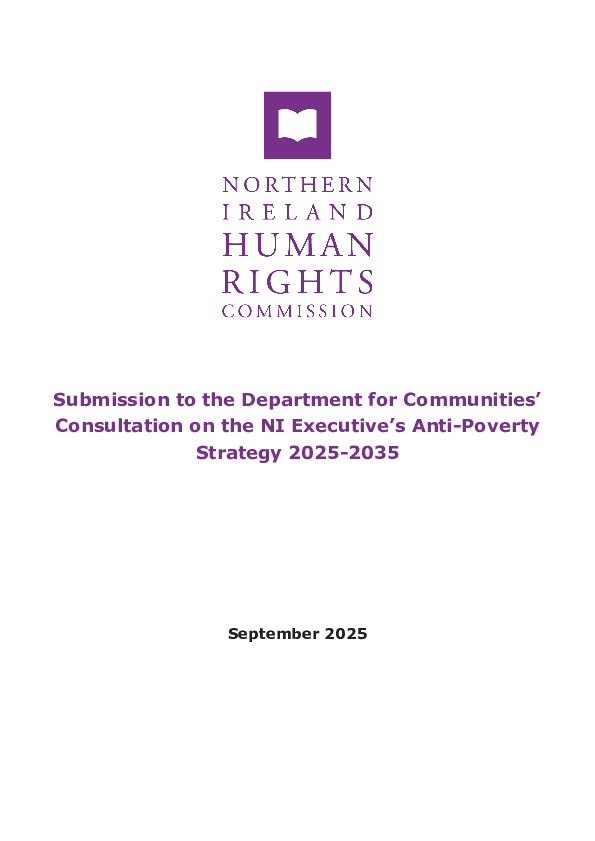Consultation Response: Submission to the Department for Communities Consultation on the Anti-Poverty Strategy 2025-2035
Summary of Recommendations
The NIHRC recommends that:
2.5 the NI Executive, working with Department for Communities, commits to incorporating a human rights based approach within the Anti-Poverty Strategy, including a list of relevant human rights standards and ensures that the obligations flowing from these human rights standards are reflected throughout the Strategy. The Ending Violence Against Women and Girls Strategic Framework 2024-2031 provides a starting point for how this can be achieved.
2.13 the NI Executive ensures that views expressed during the public consultation process are meaningfully considered and that the Anti-Poverty Strategy is amended, as is necessary and reasonable, to ensure that it is effective in practice and human rights compliant.
2.14 the NI Executive, working with the Department for Communities, engages with former members of the Co-Design Group and Expert Advisory Panel on the Anti-Poverty Strategy to ascertain the nature of their concerns regarding the co-design process and use this as the basis for a formalised policy for future participation processes. This includes taking learning from this process and considering examples of best practice of other processes of effective participation. The principle of effective participation should be at the core of any such policy.
2.21 the NI Executive, working with the Department for Communities, ensures that the monitoring and accountability structures set out in the proposed Anti-Poverty Strategy are robust, effective and independent.
2.24 the NI Executive, working with the Department for Communities, includes within the Anti-Poverty Strategy a commitment to either introduce or explore introducing an Anti-Poverty Act, in line with the Expert Advisory Panel on the Anti-Poverty Strategy’s recommendations. This should include a commitment to meaningfully engage with relevant civil society and representative organisations.
2.31 the NI Executive, working with the Department for Communities, includes specific reference to women and migrants as groups at high risk of poverty within the proposed Anti-Poverty Strategy, and commits to taking a gender-sensitive and trauma-informed approach to tackling disadvantage.
2.32 the NI Executive, working with the Department for Communities, should commit within the Anti-Poverty Strategy to adopting an intersectional approach to measures aimed at tackling poverty and deprivation, where relevant. This includes implementing a firm understanding across the NI Executive Departments and wider society on the effects of multiple intersectional discrimination in relation to poverty in NI.
2.47 the NI Executive ensures that any provisions taken forward under the Anti-Poverty Strategy to tackle rates of unemployment or improve access to good jobs does so in a manner which addresses identified barriers to work and poor working conditions or practices. This includes committing to considering and effectively addressing the specific experiences, barriers and needs of particular groups of individuals, including carers, women, d/Deaf and disabled people, migrant workers, and racial and ethnic minorities. Such measures should be developed, implemented and monitored through meaningful and effective engagement with affected individuals and their representative organisations.
2.52 the NI Executive, working with Department for Communities, includes within the Anti-Poverty Strategy concrete steps aimed at providing the necessary financial support, debt relief and education to ensure individuals in NI are financially resilient and not at risk from illegal lenders. This includes making a commitment to a gender-sensitive approach to debt vulnerability measures and supporting individuals in NI to safely extract themselves from illegal lending and to prosecute the illegal lenders.
2.56 the NI Executive, working with the Department for Education, introduces within the Anti-Poverty Strategy robust measures to tackle costs associated with education for families that go beyond food and uniform costs. This would include, for example, the costs associated with school trips, extra-curricular activities and travel, with the view to making access to school, particularly at primary level, free of charge.
2.57 the NI Executive, working with the Department for Education, introduces within the Anti-Poverty Strategy a commitment to ensure that children with specific needs are guaranteed affordable, accessible, of high quality and inclusive, and that reasonable accommodations are made as necessary.
2.60 the NI Executive, working with the Department for Communities, ensures that a full Human Rights Impact Assessment is or has been conducted in respect of the proposed Anti-Poverty Strategy. This assessment should consider the full range of human rights obligations that the UK Government has ratified and the NI Executive is bound by. The Human Rights Impact Assessment should also be published.
3.7 the NI Executive ensures that the Anti-Poverty Strategy is effectively funded to the maximum of its available resources and includes an express commitment to the principles of progressive realisation and non-retrogression. The NI Executive should conduct a cost/benefit analysis (or similar study) of current preventative measures to tackle poverty in NI and carefully consider the long-term budgetary implications of inaction or ineffective action.
4.7 the NI Executive, working with the Department for Communities, creates a fourth strategic pillar dedicated to measures to end child poverty, which includes concrete and measurable targets.
4.8 the NI Executive, working with the Department for Communities, reassess its positions on ending child poverty to ensure that the NI Executive is meeting its obligation to end child poverty to the maximum of its available resources. This includes reengaging with the Expert Advisory Panel and the Co-Design Group on an Anti-Poverty Strategy to establish the most effective approach.

Download Documents
Your browser is out-of-date!
Update your browser to view this website correctly. Update my browser now